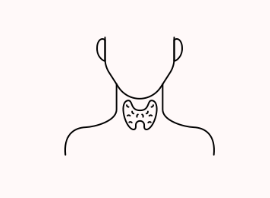Low testosterone
Last updated: 3 Nov. 2025
Reviewed by: Specialist doctors from the Elfcare quality team
Feeling more tired than usual? Finding it harder to build muscle, stay focused, or keep up your motivation? Or perhaps your sleep, mood, or libido aren’t what they used to be. These can all be signs of low testosterone, a condition where the body isn’t producing enough of this essential hormone to maintain energy, muscle strength, and overall wellbeing.
Testosterone plays a vital role not only in sexual health but also in metabolism, mood, and cognitive function. The changes can develop slowly, making it easy to mistake early symptoms for stress, ageing, or lifestyle factors.
A simple blood test can reveal whether your testosterone levels are lower than they should be, long before symptoms significantly affect your life.
Book your consultation now to test your testosterone
What is low testosterone?
Low testosterone, also known as hypogonadism, occurs when the body does not produce enough testosterone. In men, testosterone is primarily made in the testes under the control of the pituitary gland. Women also produce smaller amounts, which support mood, energy, and muscle tone.
Testosterone supports:
Muscle growth and maintenance
Energy levels and motivation
Healthy sex drive and reproductive function
Bone strength and metabolism
When testosterone levels drop below the optimal range, you may experience gradual changes in energy, body composition, and mood, often without realising that hormones are playing a part.
Symptoms of low testosterone
Testosterone deficiency symptoms may vary, and they can overlap with lifestyle or stress-related issues.
Early signs of low testosterone may include:
Ongoing fatigue or low energy
Loss of muscle mass and strength
Increased abdominal fat
Low mood, irritability, or reduced motivation
Lowered libido or changes in sexual performance
Difficulty concentrating or mental fog
Poor sleep quality
Slow recovery after exercise
Long-term symptoms may include:
Thinning hair or changes in skin texture
Reduced stamina or endurance
Fertility challenges
Because these symptoms develop slowly, many people attribute them to ageing. This is why early testosterone testing is so valuable.
What causes low testosterone?
There are multiple factors that can lead to testosterone decline.
Common causes include:
Ageing (natural decline can begin after age 30)
Chronic stress and poor sleep
Lack of exercise or physical activity
Excessive alcohol consumption
Obesity or metabolic syndromes
Long-term medication use (e.g., steroids, opioids)
Chronic illnesses such as diabetes or thyroid disorders
Pituitary or testicular conditions
Genetic or hereditary factors
By identifying lifestyle or medical contributors early, you can better support healthy hormone regulation.
How is low testosterone detected?
The most accurate way to detect low testosterone is through a morning blood test when levels are at their highest.
Key hormone markers include:
Overall testosterone in the bloodstream.
Total testosterone
Sexual hormone binding globulin
A protein that affects how much testosterone is usable
Includes both free testosterone and testosterone loosely bound to albumin, i.e., the portion that’s biologically active.
Bioavailable testosterone
Healthcare professionals review these markers together to determine whether your testosterone levels are optimal.
Elfcare’s blood test package includes these key biomarkers as part of a broader analysis of 70+ health markers, helping you identify early imbalances before they affect your energy, sleep or focus. You can book our blood package here.
For a deeper view of your health, discover Elfcare’s Full-Body Health Check – a comprehensive assessment that combines MRI imaging, advanced blood testing, and personal consultations with specialist doctors for a complete overview of your health.
Why early testing matters
Low testosterone often develops gradually. Small declines can affect performance, focus, and metabolic health before obvious symptoms appear.
Early detection can help you:
Track hormone trends over time
Make lifestyle improvements to support natural hormone function
Discuss potential treatment or prevention strategies with a healthcare provider
Preserve long-term energy, mood, muscle health, and metabolism
In short: Knowing your testosterone levels early helps you stay in control of your health and wellbeing.
How Elfcare can help
Elfcare’s hormone balance checks provide a simple, accessible way to understand your testosterone levels and hormone health. We focus on awareness and prevention, giving you the insights needed to take meaningful action with your healthcare provider.
Our clear results and guidance empower you to stay ahead of potential hormone imbalances and support your energy, focus, and long-term vitality.
Summary
Low testosterone is more common than many people realise. Its early symptoms, such as low energy, reduced muscle strength, mood changes, or low libido, are often mistaken for lifestyle stress or aging.
Regular hormone testing allows you to detect imbalances early, understand how your body is changing, and take proactive steps to support your long-term wellbeing.
When you know your hormone levels, you can make informed decisions to protect your health, performance, and energy for the future.
Last updated: 3 Nov. 2025
Reviewed by: Specialist doctors from the quality team at Elfcare
FAQs
Low testosterone, or hypogonadism, means your body is not producing enough of the hormone testosterone — which plays a key role in energy, muscle strength, libido, and overall wellbeing. The condition can affect both body and mind, often developing slowly over time, which makes it easy to overlook.
What is low testosterone?
Typical symptoms include low energy, decreased libido, loss of muscle mass, increased body fat, sleep disturbances, and low mood. Some men also notice reduced facial or body hair growth.
What are common symptoms of low testosterone?
How is low testosterone diagnosed?
A simple blood test measuring total and free testosterone — along with hormones such as LH, FSH, and SHBG — can reveal whether your hormone balance is off. The test is usually taken in the morning, when testosterone levels are at their peak.
Can low testosterone be treated or improved?
Yes. Depending on the cause, lifestyle changes such as improving sleep, reducing stress, and maintaining a healthy weight can help restore balance. In cases of more significant deficiency, testosterone replacement therapy (TRT) may be prescribed by a doctor to alleviate symptoms and restore normal levels.



